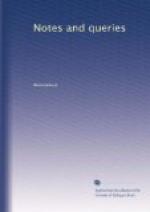I have only to notice one other observation of Mr. Ross’s, which is the following:
“When I speak of strangers being admitted, it must not be supposed that this was done by order of the House. No, everything relating to the admission of strangers to, and their accommodation in the House of Commons, is effected by some mysterious agency, for which no one is directly responsible. Mr. Barry has built galleries for strangers in the new house; but if the matter were made a subject of inquiry, it probably would puzzle him to state under what authority he has acted.”
I do not think there is anything mysterious as regards admission. I am fond of hearing the debates, and my parliamentary friends are very kind to me. Sometimes I content myself with an order from a member, which takes me into the hinder seats of the non-reporting strangers’ gallery; sometimes, when I know beforehand of an interesting debate, I get one of my friends to put my name on the “Speaker’s list,” and I then take my seat on one of the two front rows of the strangers’ gallery; sometimes, again, I go down on the chance, while the House is sitting; and if I am fortunate enough to find any one of any friends there, he generally brings me, in a few moments, an order from the Sergeant-at-arms, which takes me also to the front row of the strangers’ gallery. Some benches under the strangers’ gallery are reserved for peers, ambassadors, and peers’ eldest sons. The Speaker and the Sergeant-at-arms give permission generally to foreigners, and sometimes to some other persons, to sit in these benches. I do not know which officer of the House of Commons superintends the admission of reporters. Ladies are admitted to the Black Hole assigned to them, by orders from the Sergeant-at-arms. I have no doubt that the Speaker and Sergeant-at-arms are responsible to the House for everything relating to the admission of strangers, and without taking upon myself to say what is the authority under which Mr. Barry has acted, I have no doubt that, in building galleries for strangers in the new house, he has done what is consistent not only with the long established practice, but, under the new order of 1845, with the theory of the House of Commons.
As regards the passage quoted by Mr. Jackson from the Edinburgh Review, the reviewer would probably allow that he had overlooked the new standing order of 1845; and Mr. Jackson will perceive that the recognition of the presence of strangers does not legalise the publication of speeches. The supposed difficulty in the way of legalising publication is, that the House of Commons would then make itself morally responsible for the publication of any libellous matter in speeches. I do not see the force of this difficulty. But the expediency of the existing rule is not a proper subject for discussion in your columns.
CH.
Whatever the present practice of the House of Commons with respect to strangers may be, it does not seem probable that it will soon undergo alteration. In the session of 1849 a Select Committee, composed of fifteen members, and including the leading men of all parties, was appointed “to consider the present practice of this House in respect of the exclusion of strangers.” The following is the Report of the Committee in extenso (Parl. Pap., No. 498. Sess. 1849):




